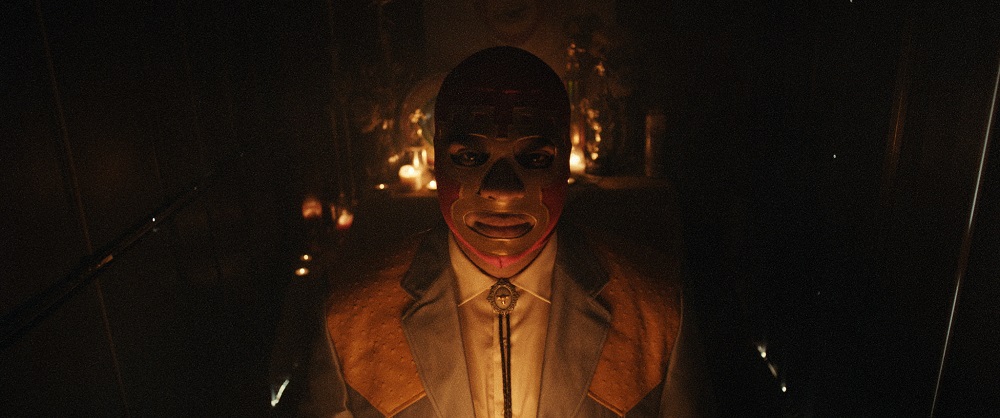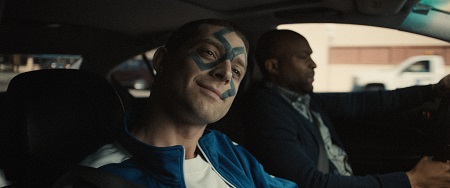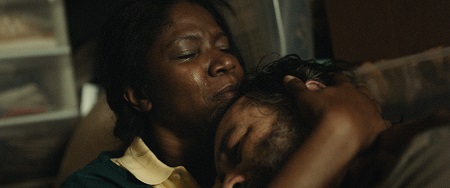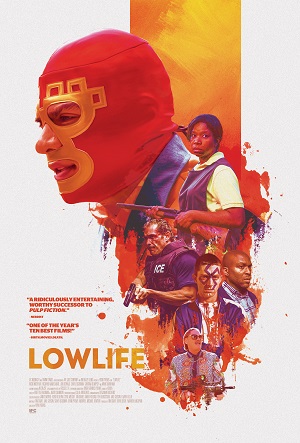
Amusingly Vulgar Lowlife a Suitably Pulpy Debut
It’s hard not to feel that co-writer/director Ryan Prows’ low budget crime comedy-thriller debut Lowlife wasn’t heavily inspired by Quentin Tarantino’s 1990’s output (Reservoir Dogs, Pulp Fiction, Jackie Brown). Split into three distinct chapters entitled “Monsters,” “Fiends” and “Thugs,” featuring overlapping storylines where a group of disparate characters are all brought together through circumstance and coincidence to be part of a larger narrative endeavor, the film is overflowing in racially-charged outbursts, shocking displays of ultra-violence, bleakly uncomfortable bits of pitch-black comedy and a flurry of four-letter expletives that would make even a hardened sailor sitting in a bar swilling rum uncomfortably blush.
Crazy thing, for the most part Prows’ feature-length debut doesn’t end up feeling like some sort of Tarantino knockoff, especially once it gets rolling and the film’s second chapter, “Fiends,” kicks into high gear. There’s some decent character development, some even better shocks and a couple of strong performances that are far more emotionally compelling than at first blush they looked like they were going to be. All-in-all, the movie is very easy to watch, everything building to a suitably blood-soaked climax that works a heck of a lot better than it maybe has any right to.
As stated, there are a number of storylines and characters at play here. Budget hotel owner and recovering junkie Crystal (Nicki Micheaux) makes a deal with local crime lord Teddy “Bear” Haynes (Mark Burnham) for a kidney to save her husband’s life. Accountant and family man Keith (Shaye Ogbonna) picks up his former best friend Randy (Jon Oswald) when he gets out of prison only to see he has a giant swastika tattooed across his entire face. Disgraced former Mexican wrestler El Monstrou (Ricardo Adam Zarate) finds himself battling anger management issues while working as an enforcer for a local loan shark. When his pregnant wife Kaylee (Santana Dempsey) goes missing, he drops everything in a mad quest to find her. Agent Fowler (Jose Rosete), a crooked ICE officer, kidnaps illegal aliens and undocumented workers so Teddy can turn out the teenage girls as prostitutes and sell the organs of the others on the medical black market.
The opening scene is sensational, a solo Agent Fowler breaking into a room at Crystal’s hotel to roust a number of illegal migrant workers. He lines them all up outside and it’s a genuine question what it is he’s about to do. Micheaux’s performance during this sequence is a quick punch to the gut, the actress battling an emotional tsunami as she wrestles with whether or not to say anything to the obviously rogue ICE officer working well outside his mandate. Crystal waffles back and forth before finally, almost begrudgingly, putting herself right in the middle of harm’s way as she calls out Agent Fowler for his actions, his response a terrifying threat of looming death that chilled me to the bone.
I can’t say the movie elevates to that level again, and there are certainly some lumpy sequences that tend to run aimlessly in circles before lackadaisically finding their way back to the central plot. The “Monsters” section is particularly troublesome, this segment feeling the most self-indulgent and directionless. As clever as some of the dialogue here might be, most notably a conversation between El Monstrou and a 15-year-old girl about to celebrate her Quinceañera, it’s also where the film feels the most like a thinly veiled Tarantino knockoff. But there is an still urgent energy to Prows’ film that kept me watching, and by the time Crystal, El Monstrou, Keith and Randy finally found themselves together standing in the same room I was more than ready to discover where things were going to go to next.
The “Fiends” section is the film at its most consistent. Not only do we get fairly good insight into who Crystal is, what she has dealt with in her life and why she is so determined to do what she feels is the right thing, even better is the back and forth banter happening between Keith and Randy as they drive back into town from the prison. Most of it has to do with the gigantic swastika on the latter’s face, of course, the former beside himself that his best friend would allow a bunch of white supremacists to do that to him, even if his survival behind bars required he get it. Their conversations have a surprisingly complex depth I wasn’t expecting. Better, they’re also genuinely funny, varying aspects of each man’s character coming to the forefront as the two unwittingly descend further and further into the morally repugnant muck and mire their association with Teddy has tragically produced.
The climax is suitably violent, and I honestly love the fact that Prows keeps the blood and gore to a minimum, the visceral impact of my imagination running amok far more unnervingly effective in the long run than anything he could have splashed across the screen could have been. He also does a nice job of bringing all his different storylines and characters together into one place with believable coherence. Finally, even if it isn’t unexpected, El Monstrou’s transformation from belligerent thug to potential selfless superhero is still extremely well executed, the character quietly becoming the heart and soul of the entire opus. Lowlife might be a little derivative of the myriad of low budget crime thrillers that became so popular during the 1990s, but that doesn’t make the film itself any less enjoyable, Prows crafting an exhilarating debut that’s got me genuinely excited to see what he’ll get up to next.
Film Rating: 3 (out of 4)








